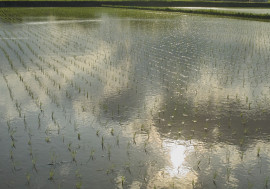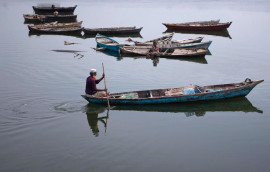
Experts from Pakistan and India have called for promoting low carbon energy sources, conservation of biodiversity, enhanced water-use efficiency and building resilient communities and networks to cope with the threat of climate change.
They were speaking at a plenary session titled “Indi-Pakistan Dialogue on Climate Change and Energy”, organised by the Sustainable Development Policy Institute (SDPI) and Heinrich Boll Stiftung (HBS) here on Thursday.
The experts were of the view that governments and civil society in both countries must work together to cope with the escalating pressures of climate change by turning the challenges into opportunities at policy level.
Environmentalist Dr Shaukat Hameed Khan while talking about the energy crises in Pakistan and India suggested that both the countries need to work together to ensure universal access to sustainable and affordable energy.
Scientist Ali Tauqeer Sher said that though climate change is a global issue, policymakers eschew making it a priority on their domestic agendas. “There is a need to establish a climate change policy group between decision makers in the two countries to further the issue at international forums.”

While speaking on water, Adil Murtaza said that the water scarcity that faces both countries today was due to climate change and natural disasters. “Pakistan and India both suffer from a lack of inter-seasonal storage of water. We cannot have sustainable, long-term delivery of water without storage,” he said.
While talking about the Indus Water Treaty, Murtaza said both countries do not share data with each other, which was essential for cooperation on water issues.
Dr Tariq Banuri, who teaches city and metropolitan planning at the University of Utah, USA, said that climate change was much more certain now than ever. He said that the leadership vacuum at the global level was causing weak outputs to meet climate threats. “The costs are huge and we need to work together to tackle the issue now,” he said.
Zeenat Niazi from New Delhi, who has been working on development alternatives for the past three decades, stressed on the need to explore alternative energy sources at local level to replicate it in other parts of the country.
“Gains made twenty years ago are being lost now. We are going back to the drawing board,” said environmental expert, Shafqat Kakakhel.
Kakakhel said that Pakistan and India both must utilise the best available scientific and local knowledge to prepare the best policy frameworks. “Cooperation is not a luxury. It has become a necessity,” he added.
Experts suggested that networks of expatriate South Asians can provide invaluable support in the form of financing, knowledge sharing and access to information and technology.
Haranjit Singh from Action Aid India said most countries were now in a position to backtrack and plan. “Pakistan and India do not need to compete with one another. They need to work together.”
The speakers said that recommendations made at SAARC summits on climate change pertaining to food security and disaster risk reduction should be implemented through enhanced cooperation and removal of impediments.
The SAARC countries should carry out a feasibility study on the establishment of a green climate fund for South Asia. Arif Allaudin said, “We cannot stick to the business-as-usual approach.”
Published in The Express Tribune, December 13th, 2013.












































COMMENTS
Comments are moderated and generally will be posted if they are on-topic and not abusive.
For more information, please see our Comments FAQ